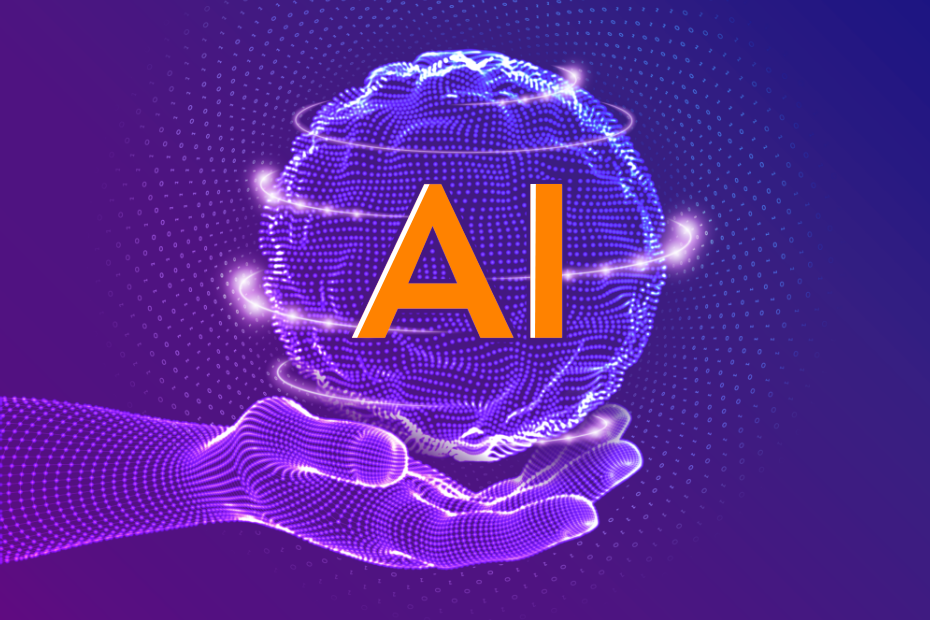
Artificial Intelligence (AI) has become an essential element in shaping the future of industries worldwide, especially in the realm of software development. AI and software development are embarking on an intricate dance, reshaping the operational fabric of businesses. But like any dance, missteps can occur. While the fusion of AI into software development carries immense potential to amplify business operations, it also presents its own set of unique challenges. Intrigued about this double-edged sword? Join us as we navigate the captivating, yet complex, role of AI in modern software development.
The intersection of AI and software development
At their core, AI and software development aim to solve complex problems. The interplay between the two creates innovative solutions that allow businesses to deliver more value to their customers.
Gartner’s predictions from 2019 said that about 25% of knowledge workers will use a virtual assistant by 2021. Fast forward to the present, and the global AI market is valued at over $136.55 billion and is projected to expand at a compound annual growth rate of 37.3% by 2030.
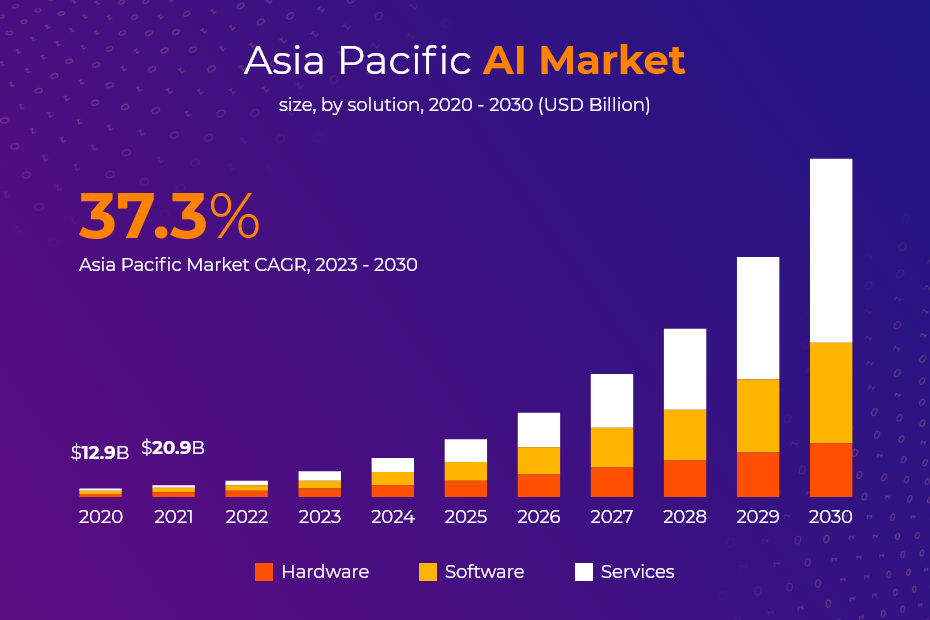
Source: GVR
In a survey for the 2020 artificial intelligence global executive study and research project Expanding AI’s Impact With Organizational Learning, MIT Sloan Management found out that 87% of global organizations believe that AI technologies will give them a competitive edge. No wonder the industry is on the rise - these tools were in demand even before the ChatGPT boom.
With the growth of AI-powered tools and their use in companies, there is also new wave of demand for specialists. McKinsey reports that 33% of new tech hires in 2022 were AI data scientists, 30% were machine learning engineers and 22% were AI product owners or managers. The question is, what are these people bringing to the talent pool in the company when using AI tools to power up? Let’s go over those benefits.
Improved efficiency and accuracy
AI significantly streamlines software development processes by automating mundane tasks. AI algorithms help developers in code generation, bug detection, and resolution, thereby boosting productivity and accuracy. Tools like Kite and Codota leverage AI to suggest code completions, making the development process quicker and less error-prone.
One notable addition to this field is GitHub Copilot, an AI-powered code assistant. Copilot uses machine learning, especially the principles of natural language processing, to understand the context of the code and suggest relevant completions. This intelligent tool goes beyond standard auto-completion by predicting entire lines or blocks of code, effectively turning thoughts into code at a much faster rate.
This not only improves the speed of coding but also reduces the possibility of errors by suggesting more efficient or safer methods. Moreover, for developers still learning new languages or frameworks, Copilot can serve as an educational tool, providing examples of how to implement different functionalities.
Since GitHub knows that just talk isn’t enough - you need hard data to showcase your value - they measured GitHub Copilot’s impact on developer productivity and happiness. You can find it in this report from 2022. According to their respondents, 88% of them felt more productive with GitHub Copilot (Perceived Productivity), and 96% were faster with repetitive tasks (Efficiency and Flow).
It is clear that the integration of AI into the coding process, particularly with advanced tools like GitHub Copilot, significantly contributes to improved efficiency and accuracy. By removing some of the tedium and potential for errors, AI allows developers to focus more on higher-level, creative aspects of software design and development.
Intelligent decision making
AI brings a new level of intelligence to software development. Predictive models powered by AI enable developers to foresee potential issues and help make strategic decisions. AI systems can also suggest improvements for the code, contributing to better software performance.
The impact of AI in software testing
AI-driven software testing ensures reliable, high-quality software, leading to enhanced user experience and a competitive advantage for businesses. By automating testing processes, AI not only reduces the time and resources required but also increases the scope and accuracy of testing. Let's explore further how AI is revolutionizing software testing.
Speeding up the testing process
Manual testing can be time-consuming and often fails to identify hidden issues or corner cases. AI-driven testing accelerates the process, quickly identifying errors and vulnerabilities. It achieves this by using machine learning algorithms to prioritize testing tasks, analyze test results, and predict where future testing efforts should be focused.
AI testing tools also adapt to changes in the codebase, ensuring that tests stay relevant as the software evolves. They save time by eliminating the need for manual rewriting of test scripts after every change.
Boosting test coverage
AI expands the boundaries of what can be achieved through testing. Traditional manual testing, due to human limitations, can only cover a portion of all possible test scenarios. AI, on the other hand, enables comprehensive testing by identifying areas that are usually missed during manual testing. AI testing tools can evaluate the code line by line, ensuring exhaustive coverage and reducing the risk of undetected bugs making it to production.
AI is especially useful for regression testing, where it's essential to ensure that new changes don't disrupt existing functionalities. AI can quickly sift through vast amounts of test data to identify which areas need to be re-tested after an update, thus improving test coverage without significantly increasing the testing time.
Enhancing precision and predictability
AI tools use advanced predictive algorithms to anticipate potential failures even before they occur. They analyze historical data and application trends to pinpoint which areas are most likely to fail or require more rigorous testing. This predictive analysis allows teams to address problem areas proactively, enhancing the precision and reliability of the software.
In conclusion, the effects of AI on software testing are profound. With faster, more comprehensive, and predictive testing, AI is setting a new standard for software quality, reliability, and efficiency.
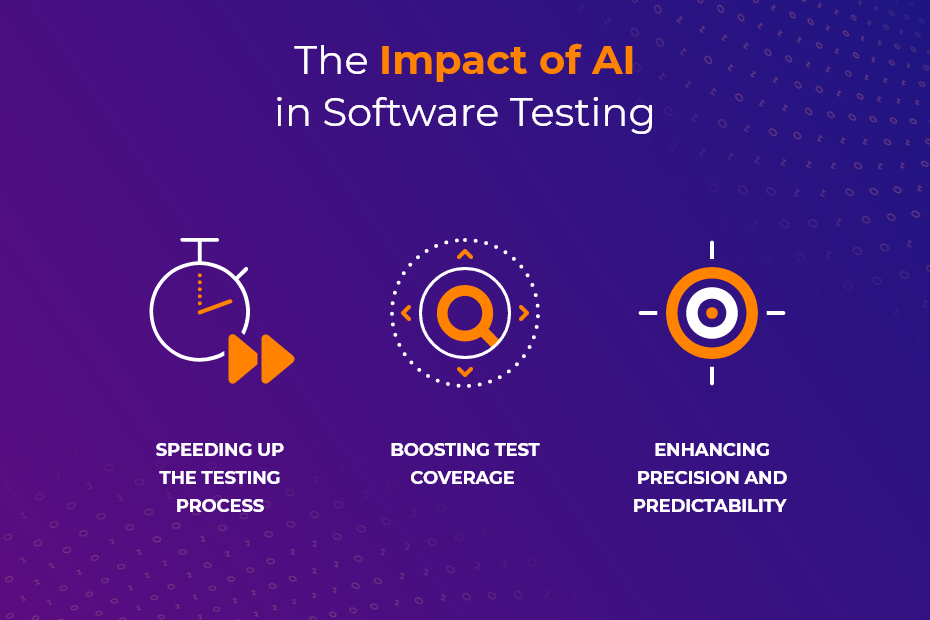
Leveraging AI for enhanced user experience
AI technology isn't just revolutionizing how software is developed and tested; it's also transforming how users interact with software. AI aids in creating applications that understand and adapt to individual user preferences, providing a more engaging, personalized, and user-friendly experience.
Personalization
AI's ability to analyze large volumes of user data enables it to provide personalized experiences that meet individual user's needs and preferences. This personalization can take many forms - from recommending relevant products or services to customizing the interface according to the user's behavior.
Take the example of e-commerce platforms. AI can track a user's browsing and purchase history, and use this information to suggest products that align with the user's interests. Or consider a news app that learns a user's preferred topics over time and tailors the news feed accordingly. This high level of personalization boosts user engagement and satisfaction, creating a positive experience that encourages users to keep coming back.
Predictive analytics
Predictive analytics is another area where AI shines in enhancing user experience. AI-powered predictive analytics can forecast user behavior and trends, enabling businesses to cater to future demands more effectively.
For instance, if an AI system detects that a user often runs a specific type of report on the last day of the month, it might start preparing that report in advance. Or, if it notices that users tend to have difficulty navigating a particular part of an app, it could suggest ways to simplify the interface or provide more explanatory tooltips. By anticipating user needs and taking proactive steps to address them, AI can create a smoother, more intuitive user experience.
Conversational AI for user interaction
Conversational AI, encompassing technologies like chatbots and voice assistants, is another potent tool for enhancing user experience. These AI systems can provide instant customer support, answer frequently asked questions, and even guide users through complex tasks within the software. Their ability to provide immediate, personalized assistance significantly improves the user's interaction with the software and enhances their overall experience.
The combination of personalization, predictive analytics, and conversational AI results in a highly sophisticated and user-centric software. This not only improves the user experience but also contributes to higher customer retention and loyalty.
The future of AI in software development
The integration of AI and software development is an ongoing process. As AI technology continues to evolve, we can expect to see further enhancements in software development practices and outcomes. The potential of AI for reshaping business operations, creating novel experiences, and transforming the technology landscape is colossal. Let's explore what the future might hold for AI in software development.
Continuous learning
One of the most significant characteristics of AI is its capacity for continuous learning. As AI systems learn from their mistakes and improve over time, we can expect even more sophisticated tools for software development and testing in the future. Advanced machine learning models will be able to understand and adapt to a software development team's specific style, making suggestions and corrections that align with the team's unique preferences and requirements.
This constant learning and adaptation will lead to AI tools becoming even more integrated into the software development process. It will result in systems that can learn the nuances of a codebase, predict potential issues before they occur, and even propose optimal solutions.
Advancements in natural language processing (NLP)
AI advancements in natural language processing (NLP) are likely to play a substantial role in the future of software development. These advancements could lead to more intuitive programming languages, making software development more accessible to a broader range of people. NLP could allow developers to describe what they want in plain language and have AI translate that into code. This would lower the barrier to entry for programming, opening up the field to more diverse contributors and potentially sparking novel, innovative approaches to software development.
AI-driven project management
The future of AI in software development also promises enhancements in project management. AI could assist in planning and managing software projects, predicting potential bottlenecks, estimating project timelines more accurately, and optimizing resource allocation. By providing a clearer understanding of project dynamics, AI will help teams make more informed decisions, leading to smoother project execution and higher success rates.
Enhanced cybersecurity
As software becomes more complex, so do potential security threats. AI has the potential to greatly enhance cybersecurity by identifying vulnerabilities, predicting threats, and responding to attacks in real-time. This will be increasingly important as we continue to move towards a more digital, interconnected world.
In conclusion, the future of AI in software development is not only exciting but also transformative. By pushing the boundaries of what's possible, AI is set to revolutionize the way we build, test, and use software, leading to an era of unprecedented innovation and efficiency.
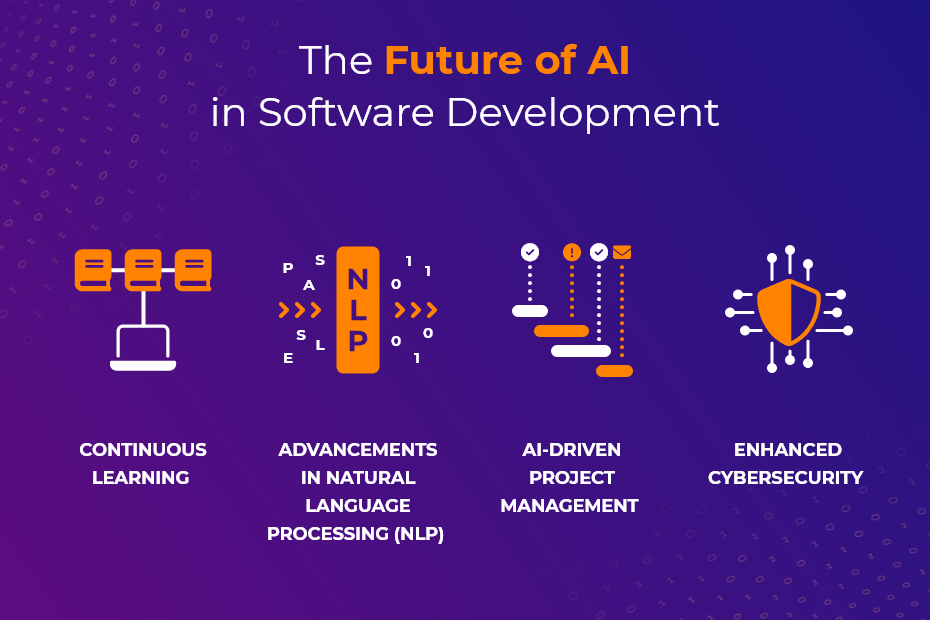
The challenges of integrating AI into software development
While the journey of integrating AI into software development can be filled with promise, it's not without its bumps and curves. Let's dive into some of the challenges that companies may encounter on this exciting yet complex path.
Unpredictability of AI systems
AI systems, particularly those utilizing advanced machine learning models, often operate as 'black boxes'. This means that even the developers who create them may not fully understand how they generate certain outputs from given inputs. This lack of transparency can lead to unexpected outcomes, making debugging and troubleshooting a difficult task. The unpredictability of AI systems also raises concerns about reliability in critical applications where an unforeseen behavior could have significant consequences.
Risk of over-reliance
While AI offers many benefits, there's a risk that over-reliance on it could stifle human creativity and intuition, both of which are integral to the software development process. AI should be seen as a tool to assist developers, not replace them. Software development is as much an art as it is a science, requiring human innovation, problem-solving skills, and a deep understanding of user needs – all of which are areas where humans still outperform AI.
Infrastructure and investment
Implementing AI in software development isn't a small undertaking; it requires substantial data, robust infrastructure, and a significant investment. Building and training AI models necessitate access to vast amounts of high-quality data, and the computational resources to process it, which can be out of reach for smaller companies. Moreover, integrating AI into existing systems and processes may require considerable re-engineering, translating into additional time and financial investment.
Ethical considerations
AI's potential misuse is a serious ethical concern. There are worries about how AI could be used to create malicious software or how it might inadvertently introduce bias into software systems. These potential issues underline the importance of robust ethical guidelines and rigorous testing when integrating AI into software development. Moreover, there are also privacy considerations, particularly when AI systems handle sensitive user data.
In conclusion, while AI offers tremendous opportunities for enhancing software development, these challenges underline the need for a balanced, thoughtful approach to its integration.
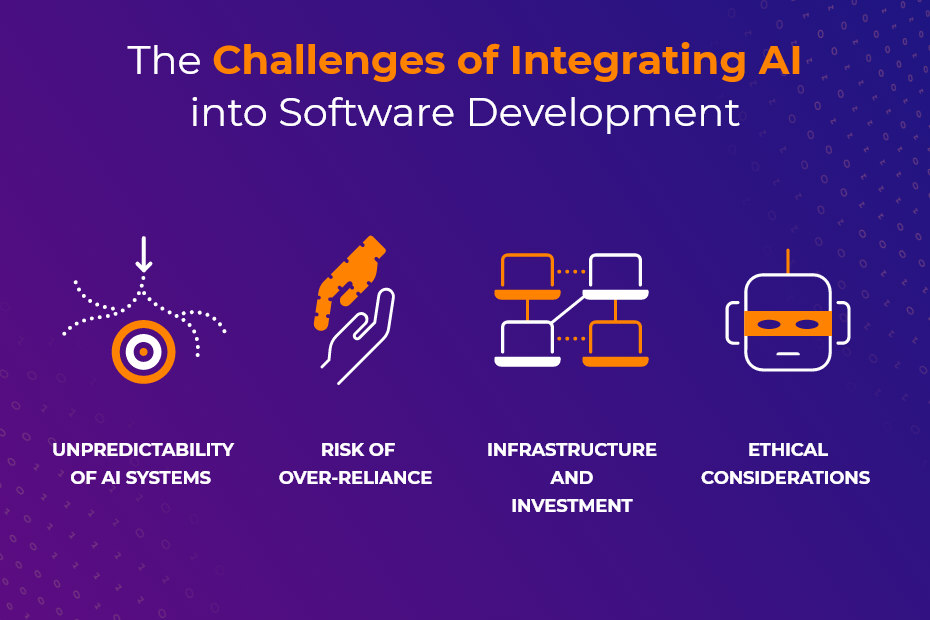
Stay in the loop about AI's potential with Rare Crew
In the rapidly changing tech world, keeping informed about trends like AI is essential for all businesses. Rare Crew is your ally on this learning journey. As a seasoned software development company, we understand the subtleties and possibilities of AI and other emerging technologies.
Our goal is to share these insights with you, allowing you to better understand and appreciate the potential impact of AI on the software development landscape. With Rare Crew as your knowledgeable guide, let's together explore the transformative power of AI in shaping the future of software development.